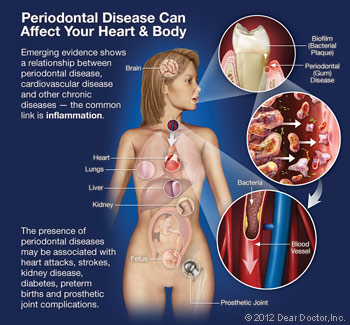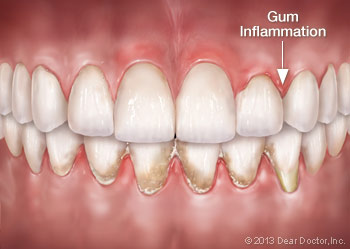Practicing excellent oral hygiene is the key to maintaining good overall health – for patients of all ages! Parents must introduce proper oral care early in a child's life, as early as infancy. Parents are responsible for ensuring their children brush and floss every day, and we encourage them to lead by example.
In recent years, bacterial inflammation associated with gum disease has been linked to chronic health problems, such as stroke, coronary artery disease and premature, low birth-weight babies. Yet there are a number of things you can do to help protect your teeth and your overall health. Visiting your dentist at least twice a year allows us to thoroughly clean your teeth, and dental exams give us the ability to evaluate any potential problems (i.e. cavities, gingivitis, etc.) before they become more serious. We are also able to recognize whether a patient is getting proper nutrition, maintaining a proper oral hygiene regimen and whether there are any growth or development problems.
To ensure you and your family are practicing good oral hygiene at home, be sure to:
- Brush at least three times a day using a fluoridated toothpaste
- Floss daily
- Eat a well-balanced, healthy diet
- Stop smoking
- Discontinue the use of smokeless tobacco products
By following these steps, you can help prevent common problems, such as cavities, gingivitis, gum disease, oral cancer, as well as prohibit the development of more serious diseases that affect your overall health, including heart disease and diabetes.
Maintaining good oral health has many rewards: A sparkling smile, fresh breath, and healthy gums. But recent scientific evidence suggests that it may have an even greater benefit to your overall health: Specifically, it could potentially reduce your risk for a number of systemic (whole-body) diseases, including cardiovascular disease (CVD), diabetes, and rheumatoid arthritis — even premature birth.
Periodontal (gum) disease is estimated to affect nearly half of all Americans, and is the major cause of adult tooth loss. Numerous studies have shown that patients with severe periodontal disease are at increased risk for developing cardiovascular disease. Periodontitis may also increase the chance that diabetes will develop or progress, and research suggests an association between gum disease and adverse pregnancy outcomes as well.
Inflammation: Friend and Foe
 What's the link between diseases of the mouth — like gum disease — and those of the body? They are connected by the body's natural reaction to harmful stimuli, which we call the inflammatory response. Often characterized by pain, redness and swelling, inflammation is a process by which your immune system responds to damage or disease in your tissues. Inflammation can help the body heal — or, if it becomes chronic, it can lead to more serious problems.
What's the link between diseases of the mouth — like gum disease — and those of the body? They are connected by the body's natural reaction to harmful stimuli, which we call the inflammatory response. Often characterized by pain, redness and swelling, inflammation is a process by which your immune system responds to damage or disease in your tissues. Inflammation can help the body heal — or, if it becomes chronic, it can lead to more serious problems.
Gum disease (periodontitis), CVD, diabetes and rheumatoid arthritis are all associated with the same type of inflammatory response. Studies have found that moderate to severe periodontitis tends to increase the level of systemic inflammation — a condition that may smolder in the background, awaiting the right conditions to flare into a more serious disease. It has also been shown that the same strains of bacteria that are found in inflamed gum tissue may also appear in the arterial plaques of individuals suffering from CVD.
How Does It Work?
While there is intriguing evidence of a link between gum disease and other systemic diseases, further studies will be needed to prove whether one causes the other. At present, however, several mechanisms have been proposed to explain how the connection works. One suggestion is that oral bacteria themselves may enter the bloodstream, form into clumps, and trigger systemic inflammation. The inflammatory response can cause swelling of cells and tissues, which narrow the arteries and increase the risk of blood clots.
Another possibility is that byproducts of oral bacteria released into the bloodstream could trigger the production of substances called CRPs (C-reactive proteins) in the liver. These proteins tend to inflame blood vessels and promote the formation of clots, possibly leading to clogged arteries, heart disease and stroke. Elevated CRP levels, according to some studies, are a stronger predictor of heart attack than cholesterol levels.
What You Can Do
Since chronic inflammation is a systemic problem, the best way to begin controlling it is via a whole-body approach. Maintaining a healthy weight, getting moderate exercise (and, if you use tobacco, quitting the habit) will help with this. So will bringing untreated inflammatory diseases, such as periodontitis, under control.
We have a number of effective treatments for periodontal disease, including nonsurgical procedures such as root cleaning and the local application of antimicrobials. For more serious conditions, conventional or laser gum surgery is an option. Finally, to keep your gums healthy between office visits, we can help you develop an effective oral hygiene routine you can practice at home.
Although it's too early to say that periodontal disease causes heart disease or other systemic conditions, they seem to have a connection. And while we can't change genetics, we can control external factors like excess weight, tobacco use… and gum disease. Maintaining good oral hygiene is the best way to avoid periodontal problems. But if problems occur, don't wait: The sooner we begin treatment, the better your chances for controlling gum disease — and perhaps systemic diseases too.
